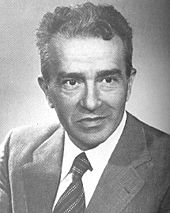Pietro Ingrao
Pietro Ingrao (born March 30, 1915 in Lenola , † September 27, 2015 in Rome ) was an Italian journalist and politician . Ingrao was one of the most influential figures in the Italian Communist Party (KPI). He was an uninterrupted member of the Italian Chamber of Deputies from 1948 to 1992 (ten legislative terms) and its President from 1976 to 1979.
Career

After studying law , literature and philosophy , Ingrao took part in anti-fascist activities at the University of Rome in 1939 and joined the KPI in 1940. From 1943 he worked in the underground in Milan on the publication of the banned KPI newspaper L'Unità and took part in the anti-fascist resistance in Milan and Rome. From 1947 to 1957 he was editor-in-chief of L'Unità . In 1956, the 8th Congress of the KPI elected him a member of the national secretariat. Ingrao was a member of parliament since 1948, and from 1968–1972 chairman of the Communist parliamentary group. In the wake of the "Historic Compromise" between Communists and Christian Democrats , he was President of the Chamber of Deputies from 1976–1979 , of which he was a member until 1992.
In 1966 Ingrao entered the XI. Party congress of the KPI for the first time with the demand for a right to public settlement of differences of opinion in the party organized according to the principle of " democratic centralism ". In the following years Ingrao became the spokesman for the left wing of the party, which opposed the tendency of the party majority to reduce the program of reshaping society to mere reforms. Ingrao's wing also turned against the "Moscow loyal" and "orthodox" minority currents and sharply criticized the real socialism of the Soviet Union. Ingrao worked with groups of the new left, such as the publisher of the daily Il Manifesto , who were excluded from the KPI in 1969 , and called for the party to be opened up to the new protest movements. He had a strong influence on the trade union left, where he was close, for example, to Fausto Bertinotti .
At the last KPI party conference in February 1991, Ingrao was one of the opponents of the majority-led transformation into the Democratic Party of the Left , of which he remained a member until 1993. In early March 2005, a few weeks before his 90th birthday, Ingrao joined the Rifondazione Comunista . In his application to join, he particularly supported their advocacy of nonviolence.
literature
- Pietro Ingrao: mass movement and political power . Afterword by Detlev Albers (original title: Masse e potere , Editori Riuniti, Roma 1977, translated by Werner Trapp). VSA , Hamburg 1979, ISBN 3-87975-158-7 .
- Pietro Ingrao / Rossana Rossanda : Appointments at the end of the century. A debate about the development of capitalism and the tasks of the left . VSA, Hamburg 1996, ISBN 3-87975-679-1 .
Web links
- Literature by and about Pietro Ingrao in the catalog of the German National Library
Individual evidence
- ^ Addio a Pietro Ingrao, morto a Roma lo storico dirigente del Pci . La Repubblica , September 27, 2015.
| personal data | |
|---|---|
| SURNAME | Ingrao, Pietro |
| BRIEF DESCRIPTION | Italian journalist and politician, member of the Camera dei deputati |
| DATE OF BIRTH | March 30, 1915 |
| PLACE OF BIRTH | Lenola |
| DATE OF DEATH | September 27, 2015 |
| Place of death | Rome |

